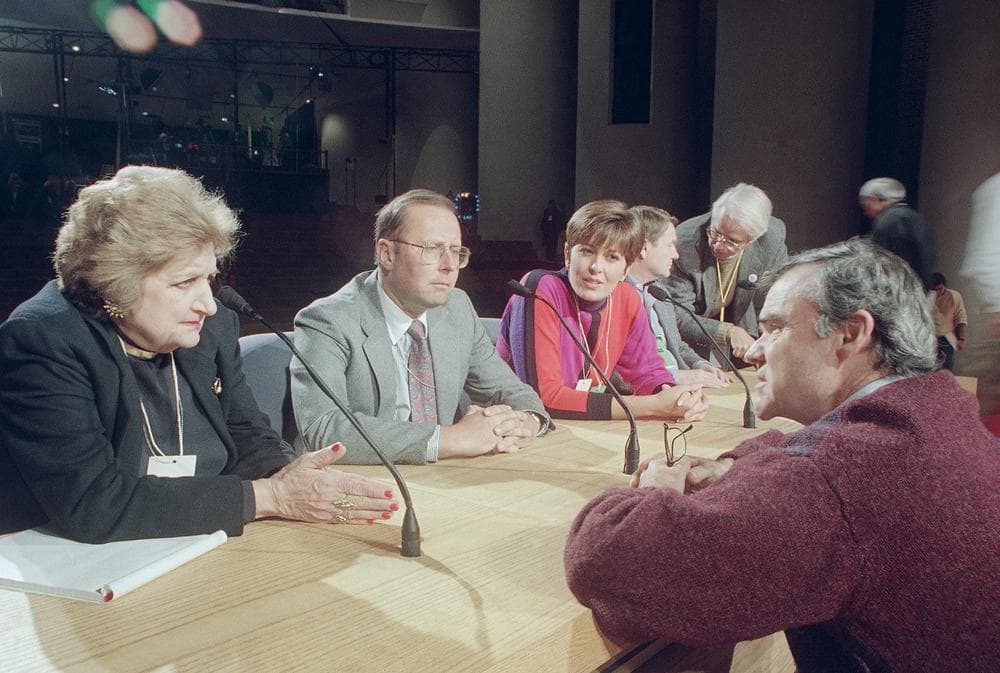Advertisement
A Viewer’s Guide To Debates
A confession: I love political debates.
My love affair with this relatively new American institution started in 1988 when I was approached by the Commission on Presidential Debates to be executive producer for what was then a nugget of an idea. Organizers wanted to stage three presidential debates and one vice presidential debate in the weeks prior to the election.
With the chairmen of the two major parties, Democrat Paul Kirk and Republican Frank Fahrenkopf, spearheading the plan, I was intrigued. So I signed on and then returned in the same role four years later. In the years since, I have advised or produced a number of other political debates.
Up until 1988, debate sponsorship was subject to a quadrennial tug of war between the parties. It usually produced one or two debates that satisfied no one, and left the public interest on the cutting room floor. It was back in the day when Kirk and Fahrenkopf, otherwise hard charging partisans, could cooperate on a project that was in the interest of both the voters and the candidates. Hard to believe it has survived the toxic political trench warfare of the last 25 years.

In the first debate of this election season, the first match-up between President Barack Obama and his Republican challenger Mitt Romney left Democrats in a blue funk and the GOP dancing with glee. Al Gore blamed the altitude in Denver. Other TV opinion merchants opined that Obama was rusty. Perhaps Sen. John Kerry, his sparring partner at debate camp, went too easy on the president. But I suspect the Obama campaign failed to anticipate how quickly Romney would run to the political center — free at last to shake the proverbial Etch-A-Sketch.
Challengers always do well in the first debate against an incumbent. Ronald Reagan-Jimmy Carter in 1980 is the textbook example. Reagan looked and sounded like a president. He was amiable where his political opponents had portrayed him as a snarling conservative ready to throw welfare mothers off the rolls.
Keep in mind debates are a lot more like an opera than a gladiatorial clash as they are often portrayed in the press. Why opera? Because both require the audience to pay attention to both the words and the music.
So for the next two presidential debates, and the vice presidential debate, here is a viewer’s guide:
Manner Of Delivery
Will the candidates be talking to you at home, to one another, or even to the audience in the hall? Delivery matters because we expect candidates not only to know the answer to the question — but also to deliver the answer in an accessible way. Romney showed us in the first debate he can walk that fine line.
Mutual Courtesy
The candidates for the nation's highest office have to look and sound dignified — indeed, presidential. Voters expect nothing less. No “Crossfire” type exchanges, please. Though we expect these encounters to be civilized – they certainly don’t radiate much warmth. The candidates are essentially strangers who have spent the better part of the last year mounting attacks on one another — some very personal. Their body language at the beginning, as they address each other, and after the debate is crucial.
The candidates for the nation's highest office have to look and sound dignified — indeed, presidential. Voters expect nothing less. No “Crossfire” type exchanges, please.
The Unexpected
Before the first debate, Romney’s camp intimated that he would skewer Obama with rehearsed zingers. But for one semi-clever quip ("Mr. President, you're entitled as the president to your own airplane and to your own house, but not to your own facts.”), it didn’t happen in the first debate. A memorable, biting put-down (a la Lloyd Bentsen to Dan Quayle in 1988, "Senator, you're no Jack Kennedy.") that will remain in people’s minds — and be played over and over again on television — can have a huge impact.
The Closing Wide Shot
It’s the last visual viewers have before the network anchors and experts take over so it leaves a lingering impression. The idea is to make it look spontaneous, but it’s carefully choreographed. No matter the outcome, the candidates’ spouses, beaming and proud, spring quickly from backstage to meet their other half with a confident, congratulatory embrace. (Hint: To get the full effect, it’s best to watch C-Span. They linger longest.)
Spin Cycle
Right after the debate, candidates’ surrogates meet with journalists in “spin alley” to try and persuade them that their guy won. In 2000, Bush’s team heralded a couple of minor factual errors by Gore – as well as what they perceived as a condescending tone on the part of the vice president. “He lied and he sighed,” they said. Much later, Gore’s campaign manager conceded, saying, “They beat us after the debate in the spin room.” In a close race, the prevailing strategist-spun narrative can be do or die.
When debate month is over, and the presidential debates are history, will the first encounter in Denver look as important as it does now? Probably not. But then again making political predictions has never really been my forte.
For most voters, what can be seen on television is the campaign. And in this last month, what we'll see is paid ads (which by now have largely lost whatever impact they might have had because we've seen so many) and debates. In the latter, more important, context, we see the candidates under the most pressure they have ever faced, handling questions that take them out of the narrow cocoon of their canned talking points and show us whether they can take the heat that comes with higher office.
This program aired on October 11, 2012. The audio for this program is not available.